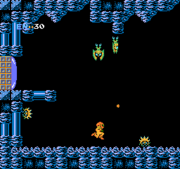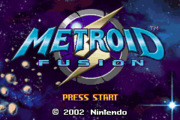Metroid series
|
|
The Metroid series, a creation of the late Nintendo visionary Gunpei Yokoi, is a series of shooter/platformer/adventure games featuring female bounty hunter Samus Aran on various missions. The series spans through almost all Nintendo systems, starting with Metroid on the NES, and many sequels on the Game Boy, Super NES, Game Boy Advance and GameCube. There was never a title for the N64, Game Boy Color or Nintendo Virtual Boy.
| Contents |
Overview
Samus Aran
Main article: Samus Aran
The heroine, Samus Aran, is a female bounty hunter.
Power-ups
Main article: Items in the Metroid series
The gameplay of all Metroid games revolves around Samus collecting items, or power-ups, that give her the ability to overcome obstacles. Many of the items recur throughout the series, with some modifications, such as the morph ball, which allows her to curl into a small ball to access tight spaces and drop bombs.
Metroids
Main article: Metroid (video game species)
The eponymous in-game Metroids are large, jellyfish-like creatures with quadripartite nuclei. They are capable of siphoning an undetectable life energy from any living organism; generally causing the death of the victim in the process. Metroid II established a five-stage life-cycle in which the Metroids go through two stages of ecdysis followed by two stages of mutation. Thus maturing through four previously unknown forms: Alpha, Gamma, Zeta, and Omega. Metroid Prime introduced two new, Phazon-mutated forms: Hunter Metroids, which sport tentacles enabling long-range energy siphoning; and Fission Metroids, which divide into two new Fission Metroids (with different elemental weaknesses) after absorbing a discrete amount of energy.
Bosses
The main enemies of the games in the Metroid series are divided into two groups: bosses and final bosses. Each game contains multiple bosses that are often encountered by entering a large sealed room and engaging in combat with a large creature. When sucessful, the room opens and allows further progress, usually resulting in the acquirement of an item. Final bosses are at the end of each Metroid game, and usually consist of a fight similar to a normal boss, and then a timed dash back to your ship to complete the game.
In most of the Metroid games, Kraid and Ridley make appearances as bosses, and Mother Brain sometimes appears as a final boss. In some of the games, a Metroid in some form can take the role of a boss, and sometimes even a final boss. The combat model for bosses and final bosses is usually standardized, though there are a few notable exceptions throughout the series.
Space Pirates
Main article: Zebesian Space Pirate
The main villains of many of the Metroid games are the Zebesian Space Pirates, led by Mother Brain, Ridley and Kraid. Ridley especially is a Metroid staple, appearing in Metroid, Super Metroid, Metroid Fusion, Metroid Prime, and Metroid: Zero Mission.
According to the Super Metroid manual, the Space Pirates organization also includes a winged, mantis-like species, the KiHunters.
Games
The release order of games in the Metroid series is as follows:
- Metroid (1986 - NES / Famicom Disk System, re-released for the Game Boy Advance in 2004 as a part of the Classic NES Series)
- Metroid II: Return of Samus (1991 - Game Boy)
- Super Metroid (1994 - SNES)
- Metroid Prime (2002 - Nintendo GameCube)
- Metroid Fusion (2002 - Game Boy Advance)
- Metroid: Zero Mission (2004 - Game Boy Advance)
- Metroid Prime 2: Echoes (2004 - Nintendo GameCube)
- Metroid Prime: Hunters - (2005 - Nintendo DS)
The chronology of the Metroid fictional universe does not match its release order. It is as follows:
- Metroid: Zero Mission (an enhanced remake of the original Metroid)
- Metroid Prime
- Metroid Prime: Hunters
- Metroid Prime 2: Echoes
- Metroid II: Return of Samus
- Super Metroid
- Metroid Fusion
Metroid
Mettitle.png
Main article: Metroid
The first Metroid takes place on planet Zebes. Samus travels through the planet collecting weapons and upgrades to advance to new areas and defeat Kraid, Ridley, and Mother Brain.
The game provided one of the first highly nonlinear game experiences on a home console, and the series continues to provide nonlinear gameplay with the ability to sequence break. This game, along with the rest of the series, is also notable for its blending of various genres superimposed onto a persistent world model of play.
Metroid II: Return of Samus
102938475657.jpg
Main article: Metroid II: Return of Samus
In Metroid II, Samus Aran returns in an all new adventure to exterminate the Metroids, now venturing to their home planet, SR388. Instead of the long corridors and doors she had to blast open with her gun, she now had to destroy Metroids in order to progress to the next area.
Super Metroid
Super_Metroid_(E)_-!-(8576).png
Main article: Super Metroid
Super Metroid is the direct sequel to Metroid II: Return of Samus. In the game's plot, Samus returns to the planet Zebes to destroy the Space Pirates before they use the last living Metroid larva to accomplish their plans of galactic domination.
With gameplay similar to the last game in the series, Super Metroid was one of the most popular games for the SNES when it debuted in 1994. It remains popular, and has even been named the Greatest Game Ever by the magazine Electronic Gaming Monthly.
Metroid Prime
Mp_title_med.jpg
Main article: Metroid Prime
Metroid Prime is a first-person adventure video game developed by Nintendo-owned Retro Studios and released by Nintendo in 2002 for the GameCube console. According to the fictional universe that the Metroid series is set in, Metroid Prime is the interquel of the first two installments of the Metroid series, the original Metroid and Metroid II: The Return of Samus. Metroid Prime takes place on the planet Tallon IV. The title also features connectivity bonuses with Metroid Fusion.
Metroid Fusion
Main article: Metroid Fusion
Metroid Fusion is the first game in the Metroid franchise to appear on Nintendo's Game Boy Advance portable platform. It is the sequel to Super Metroid. Metroid Fusion is chronologically set last according to the fictional universe that the Metroid series takes place in. It is unpopular among many Metroid fans, due to the unusually linear nature of the game.
Metroid: Zero Mission
Qazwsxedc.jpg
Main article: Metroid: Zero Mission
Metroid: Zero Mission is an enhanced remake and re-telling of the original NES Metroid story with additional areas and power-ups, such as the Space Jump, Super Missiles, and Power Bombs. It was the second Metroid game to appear on the Game Boy Advance.
Metroid Prime 2: Echoes
Mp2_title_309x190.jpg
Main article: Metroid Prime 2: Echoes
Metroid Prime 2: Echoes is a first-person adventure video game developed by Nintendo-owned Retro Studios and released by Nintendo in 2004 for the GameCube console. One of the main devices in the game is the concept of the light and dark worlds, somewhat similar to that seen in The Legend of Zelda: A Link to the Past but in terms of different dimensions rather than magical worlds. In terms of the Metroid timeline, Echoes is placed in between Metroid Prime and Metroid Fusion".
Metroid Prime: Hunters
920760_20041007_screen010.jpg
Main article: Metroid Prime: Hunters
Metroid Prime Hunters: First Hunt is the first Metroid game to appear on the Nintendo DS. It is in 3D, not side-scrolling like the previous Metroid games for the Game Boy and Game Boy Advance. Currently the game has only been released as a demo available with the purchase of the Nintendo DS system. It includes only a few, short gameplay modes, including Regulator, Morph Ball, Survivor, and multiplayer.
Metroid Prime Pinball
Main article: Metroid Prime Pinball
Metroid Prime Pinball is a pinball game for the Nintendo DS with a Metroid theme. It has only been recently announced.
Metroid Prime 3
Metroid Prime 3 has only been recently announced for the Nintendo Revolution. It's currently in development by Retro Studios. Electronic Gaming Monthly recently reported a rumor that Metroid Prime 3 will release for the GameCube.
Metroid movie
In 2004, the Hollywood Reporter announced that the film director John Woo optioned the rights for movie adaptations of Metroid from Nintendo. Woo would have produced the movie and also had the option to direct it. [1] (http://www.comingsoon.net/news.php?id=4202) Later in the year, it was announced that the movie has been postponed indefinitely. [2] (http://www.comingsoon.net/news.php?id=6100)
Composers
The Metroid series has been noted for its music and has had several composers during the years:
- Hirokazu 'Hip' Tanaka - Metroid
- Ryohji Yoshitomi - Metroid II: Return of Samus
- Kenji Yamamoto - Super Metroid, Metroid Prime, Metroid Zero Mission, Metroid Prime 2: Echoes
- Minako Hamano - Super Metroid, Metroid Fusion, Metroid Zero Mission
- Kouchi Kyouma - Metroid Prime
- Akira Fujiwara - Metroid Fusion
External links
- Official US site (http://www.metroid.com)
- Official Japanese site (http://www.metroid.jp)
- Metroid (http://www.nesfiles.com/NES/Metroid/Metroid.asp) at The NES Files
- KLOV entry on Metroid (http://www.klov.com/game_detail.php?letter=M&game_id=8684)
- Metroid Database - Good fansite (http://www.classicgaming.com/mdb/)
- Translated Metroid e-Manga (http://www.mechadrake.com/metroidmanga.html)
- Official Japanese Metroid e-Manga (http://kodansha.cplaza.ne.jp/e-manga/club/manga/metroid/vol01/)
- New Tourian - Fansite (http://newtourian.com/zebes.html)
- The Metroid Galaxy Guide - Fansite with articles on the game universe (http://www.metroidguide.com)
- GameFAQs entry for Metroid (http://gamefaqs.com/console/nes/data/7939.html)
- The Metroid Galaxy Guide Weapons Database (http://www.metroidguide.com/html/weaponry.htm)
- The Official Site for Metroid Prime: Hunters (http://www.metroidhunters.com)
- M.eu - The largest European-based Metroid fansite that houses information on the whole series and tons of extras (http://www.metroid-eu.com)
- Nintendo Revolution Demo of Metroid Prime 3 (http://www.gametrailers.com/gamepage.php?id=1979)de:Metroid


